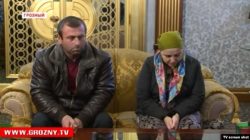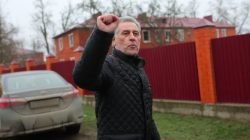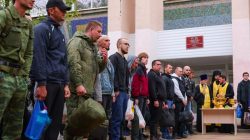
The history of current ‘Circassian question’ goes back to Russian-Circassian war (1763-1864), which ended with obliteration of Adigha republic from the world map. Circassian (Adygean) nation was subjected to genocide by Russian state and was expelled from their historic homeland. In 1864 only % 5 of Circassian population remained in Caucasia.
However, Circassians remained in their homeland, were separated from each other and now they live in 6 different administrative regions of Russia. (Adygea, Kabardino-Balkaria, Karachai-Cherkessk and North Ossetia republics, Krasnodar Krai and Stacropol Krai regions) Besides Russian Government officially announced Circassians as 4 different nations: Adygeans, Kabardians, Circassians and Shapsugs. Name Circassian was given to Adygeans living in Karachai-Cherkessk. And this was done inspite of the fact that Circassians had a common name (Adygean) and common language (Adygean language). With a regulation in the beginning of 2010 Circassian nation was separated to 2 different districts: North Caucasian Federal District and Southern Federal District, which is against international laws.
A fair solution to ‘Circassian question’ means realization of their natural and ensured by international laws right to live on their own lands as one nation. To bring Circassian Nation’s situation to an equal position with international laws, it’s necessary to make sure the return of Circassian Diaspora to Caucasus and gradually liquidate administrative borders on their historical motherland.
Lately the idea of merging Circassian republics (Adygea, Kabardino-Balkaria and Karachai-Cherkessk) into one region – Circassian Republic, has been voiced. Related to that, it should be stated that today % 10 of the Circassian population (more than 800 thousands) live in their homeland, Caucasia. The rest of the population scattered to more than 50 different countries. Because of that, with out their repatriation reshaping the boarders in Caucasus is inadmissible.
It should be understood that the idea of merging in the historical homeland does not mean to merge the republics existing today, but to unite all the nations living on the lands forming the historical Circassian land, with out any restrictions on their rights regardless of which ethnicity they belong to. What should be understood from ‘historical Circassian land’? Today a lot of people have different opinions. Some of them understand only 3 republics existing today and some others understand territory of Circassia in 1830 and there are also other opinions. On this matter the description of international laws, which indicates that ‘a nation’s territory is the territory they have before war, occupation or colonization’, should be followed. For Circassians this territory is the one in 1763, in other word before the war initiated by Russian Empire against Circassians.
Besides I want to dwell on ‘Noghai question’. With the request of Crimean Khans and considering the nation’s tragic situation, who were expelled from the lands where they lived nomadically, Circassians allowed them to live on the lands between the rivers Don and Kuban. However, it should not be understood that the mentioned territory is no more a part of Circassia.
Especially, I want to call to diaspora in Turkey, Syria and Jordan with a request to put an end to meaningless arguments about what should be understood from the word ‘Circassian’. Circassian is the name given to the nation that calls themselves Adyge. Toponym Circassia and ethnic name Circassian have been used commonly as identification for Adyges and their country in European, Arabian, Ottoman, Georgian and other sources from 17 to 20 centuries. Some certain groups’ attempts in diaspora to give the name ‘Circassian’ a broader meaning by including all nations living in Caucasus, not only unrealistic but also politically wrong and so destructive. The only reason the name Circassian is started to be used for other Caucasian nations in these countries is the fact that after the second half of 19 century, in other word after Circassians were expelled from Caucasus, the majority of exiles were absolutely Adyges.
Today the situation is swiftly changing for good, opportunities have aroused for all nations to successfully solve their own problems. Therefore in diaspora amorphous and fuzzy organizations representing all Caucasian nations are disappearing. Both Chechens and Abkhazians are busy with their own national constructions. For that reason I request to all organizations in diaspora to establish national Circassian organizations or to transform. That does not mean that we have to break our long termed ties with other Caucasian nations both in diaspora and Caucasus. But it’s necessary to take up constructing our private Circassian home, to concentrate on the problems about Circassians’ repatriation and protection of Circassian language and culture.
Any nation, turned out to be scattered to the world and any nation that found themselves in a situation like Circassians, would aspire to restoration the unity and integrity of their territory – thousand year lands of our ancestors. In hard times of Circassian history our nation did not seek for a leader, did not wait for some one to solve anything for them. Circassian individualism and principle of ‘single horseman’ says that, every person should approach to the nation’s problem as it is his own problem. Every Circassian should act as if he is the only Circassian in the world, therefore he must do everything he can, everything possible.
In this world nobody except us – Circassians – will solve the problem of our nation. I ask all Circassians in the world to forget about disagreements and personal ambitions, and focus on a fair solution for Circassian question – restoration of the unity of Circassian nation on their historical homeland.
Our case is accurate. Our way is open. God is mighty.
The commentary published on Elot.ru on 11 February was translated to English by Cavit Yılmaz
Ruslan Keshev, head of Circassian Congress in Kabardino-Balkaria








